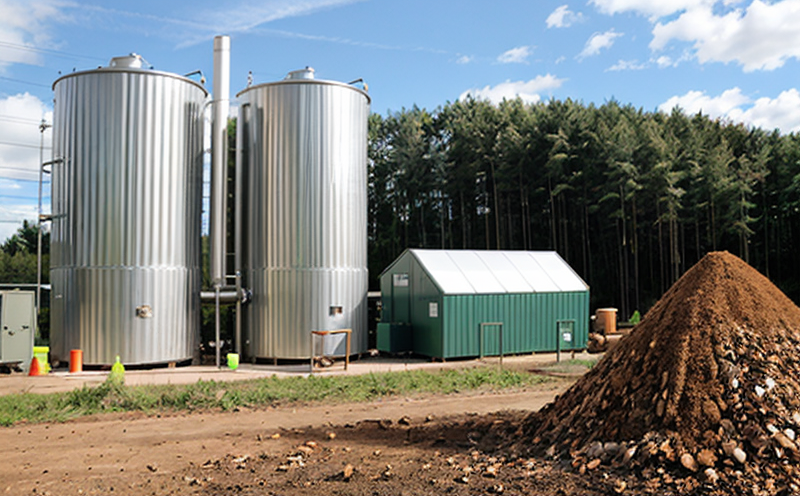ISO 23878 Particulate Matter Emissions from Waste Fuels
The ISO 23878 standard addresses the challenge of managing emissions, particularly particulate matter (PM), from waste fuels used in waste-to-energy conversion and biomass processes. These fuels are critical for generating energy while minimizing environmental impact. This service ensures compliance with international standards, supporting quality managers, R&D engineers, procurement officers, and compliance officers.
The testing process involves several stages that ensure accurate measurement of PM emissions. Specimens are prepared according to the standard’s specifications, which include detailed procedures for sampling waste fuels. The apparatus used in this service includes sophisticated analytical instruments capable of detecting even trace amounts of particulate matter. Compliance with ISO 23878 ensures that facilities meet stringent emission limits set by regulatory bodies.
Understanding the parameters involved is essential for accurate testing. Key aspects include temperature, humidity conditions during sampling, and the types of waste fuels tested. The service also covers the acceptance criteria outlined in the standard, which are critical for validating test results. These criteria ensure that emissions fall within acceptable limits to protect both the environment and human health.
Real-world applications of this testing include ensuring compliance with local and international regulations on air quality. For example, facilities using waste-to-energy processes must adhere to strict emission standards to minimize environmental impact. This service helps these facilities meet those requirements by providing accurate and reliable data.
- International Acceptance: ISO 23878 is widely recognized globally for its robust methodology in measuring PM emissions from waste fuels. Compliance ensures seamless international trade and acceptance of facility operations.
- Regulatory Compliance: By adhering to this standard, facilities can ensure they meet the stringent emission limits set by regulatory bodies such as the European Union’s Industrial Emissions Directive (IED).
Customer Impact and Satisfaction
The ISO 23878 Particulate Matter Emissions service directly impacts customers in several ways, ensuring compliance with international standards. Compliance not only meets regulatory requirements but also enhances the reputation of facilities as environmentally responsible entities. This, in turn, can lead to better procurement opportunities and enhanced customer satisfaction.
Our testing services provide comprehensive reports that help facilities understand their performance relative to emission limits. This data-driven approach enables continuous improvement and helps identify areas for optimization. For quality managers and R&D engineers, this service offers insights into the effectiveness of different waste fuels and combustion processes, supporting innovation and efficiency.
Compliance with ISO 23878 can also reduce legal risks associated with non-compliance. By ensuring accurate and reliable data, our services minimize the risk of penalties or fines. For procurement officers, this service provides confidence in selecting suppliers who meet high environmental standards, thus contributing to sustainable supply chain management.
Customer satisfaction is further enhanced by the detailed reporting we provide. These reports not only document compliance but also offer actionable insights for future improvements. This comprehensive approach ensures that customers receive value-added services beyond mere testing, fostering long-term relationships and trust.
International Acceptance and Recognition
- Global Standard: ISO 23878 is recognized worldwide for its stringent criteria in measuring PM emissions from waste fuels. This standard ensures that facilities meet the highest international standards, facilitating seamless trade.
- Regulatory Compliance: Adherence to this standard guarantees compliance with local and international regulations on air quality, including those set by the European Union’s Industrial Emissions Directive (IED).
The global nature of ISO 23878 ensures that facilities using waste-to-energy processes can operate without fear of non-compliance issues. This standard is widely accepted in major industrial sectors, providing a consistent framework for emission testing across different countries and regions.
International acceptance also brings numerous benefits to customers, including enhanced credibility and marketability. Facilities that comply with ISO 23878 standards can confidently engage in international trade without encountering regulatory barriers or delays. This global recognition fosters trust among stakeholders and contributes to a more sustainable industrial landscape.
Environmental and Sustainability Contributions
- Emission Reduction: By accurately measuring PM emissions from waste fuels, this service plays a crucial role in reducing air pollution. Facilities that comply with ISO 23878 contribute significantly to improving local air quality.
- Sustainable Practices: This testing supports sustainable practices by enabling facilities to optimize their processes and reduce waste-to-energy emissions. Such optimizations help minimize environmental impact while maximizing energy efficiency.
The service contributes directly to the broader goals of sustainability and environmental protection. By ensuring accurate measurement and reporting of PM emissions, it helps facilities identify areas for improvement in their operations. This focus on continuous improvement aligns with the principles of sustainable development, promoting a greener future.
Facilities that adopt this testing service are not only compliant but also demonstrate a commitment to environmental responsibility. This commitment enhances their reputation as responsible corporate citizens, attracting more eco-conscious customers and investors. The service thus supports broader sustainability goals by fostering environmentally friendly practices within the industry.





